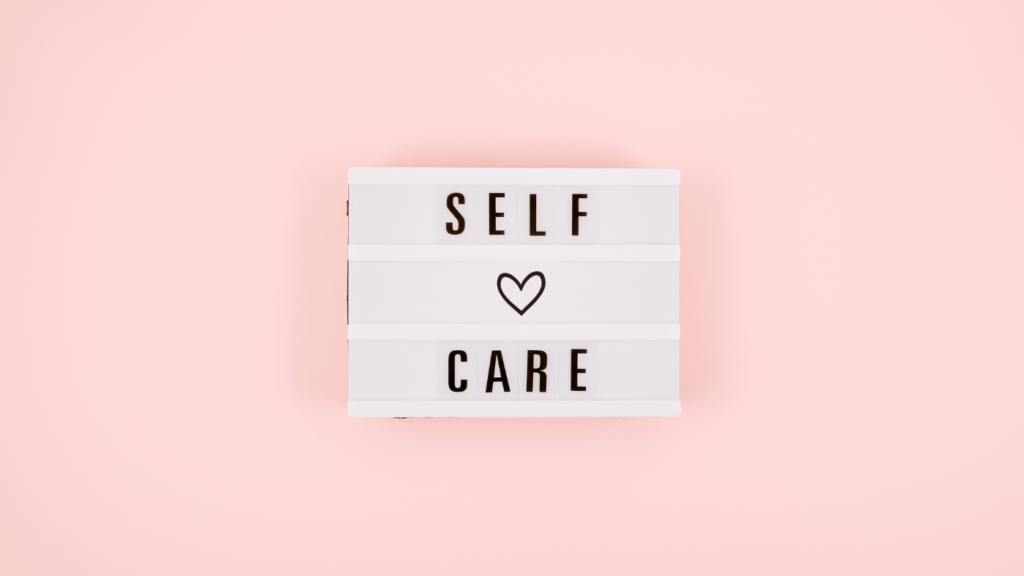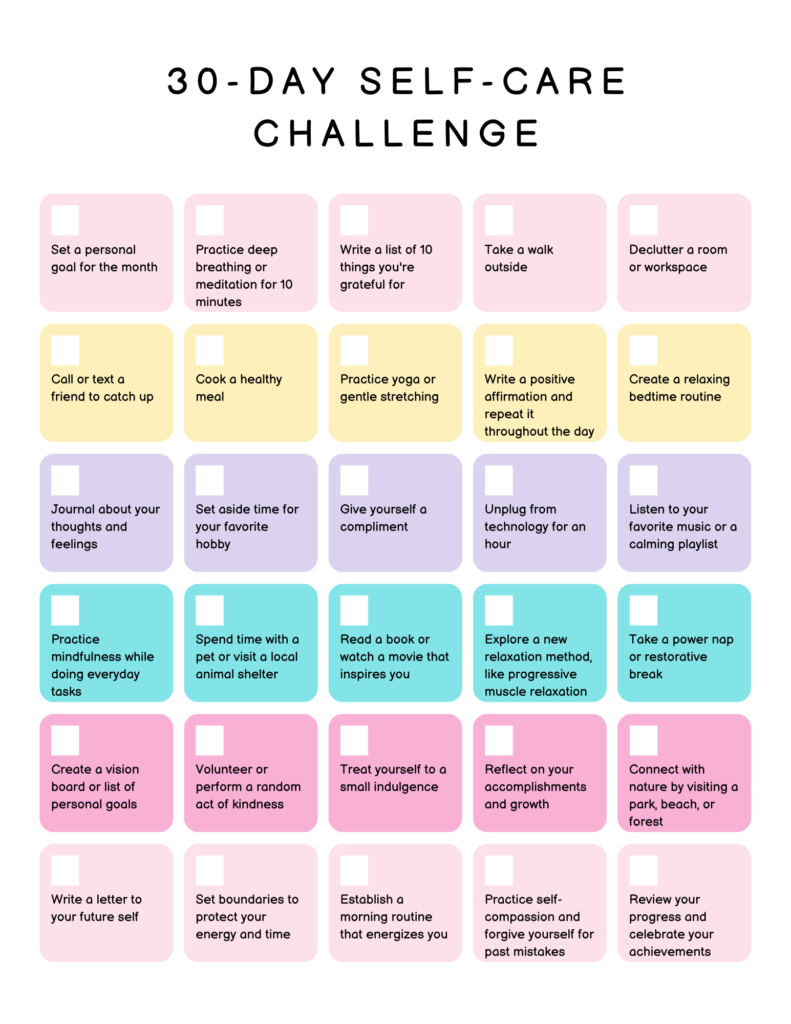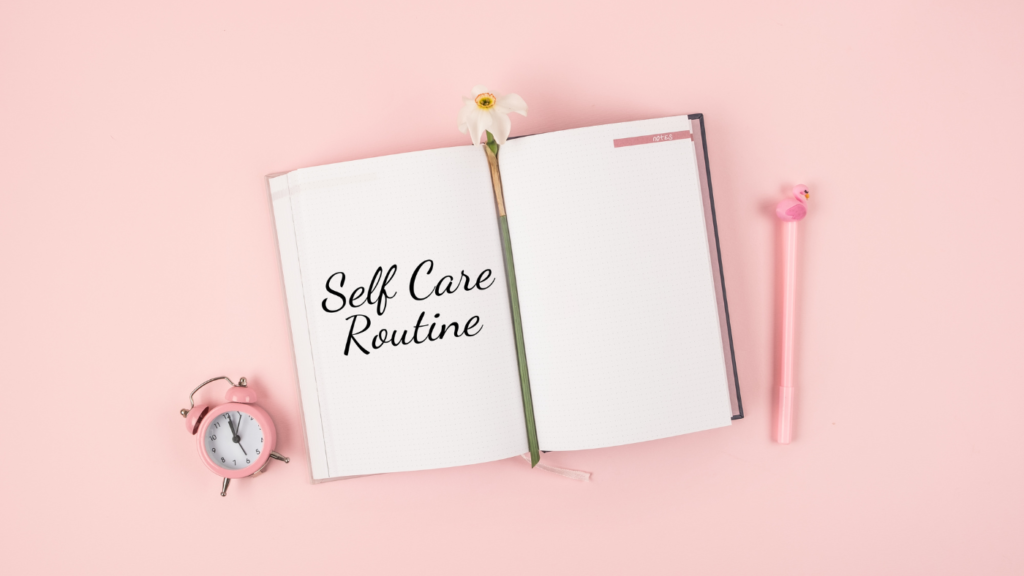I have come to the realization now that I’m 46 (today is my birthday) that self-care needs to be more of a priority in my life. With the stress of not having a regular job and with the bills starting to pile up, I’m completely overwhelmed. Often time I let myself get run down and it completely affects my health. My anxiety levels go through the roof and I don’t bounce back from stressful situations like I used to.
Just a heads-up, some of the links in my articles may be affiliate links, which means I might earn a small commission if you make a purchase through them – it helps support my blog and keeps the content coming.
With all the craziness and uncertainty in the world right now, it’s hard not to be completely stressed out.
You can’t escape all the doom and gloom, it’s all over the news and especially on social media. Add in the stress of daily life and things can become overwhelming.
Life can often feel like a never-ending race, with demands and responsibilities constantly pulling us in different directions. Amidst this chaos, it’s easy to put our well-being on the back burner.
However, self-care is not a luxury, but a necessity for maintaining a healthy and balanced life.
I have researched why self-care is so important. Here’s what I found.

Why is Self-Care So Important?
Self-care is the practice of taking deliberate actions to nurture and care for yourself. It involves prioritizing your physical, emotional, and mental well-being. Here are a few reasons why self-care should be an essential part of your routine:
1. Mental Health Matters
Indulging in self-care is not just a leisurely pursuit; it’s a strategic move for enhancing your mental well-being. When the pressures of life mount, our ability to navigate daily challenges takes a hit. This is precisely why the practice of self-care is not just beneficial but downright crucial.
Imagine a life where you are not just coping but thriving. That’s the promise self-care holds. Engaging in activities that bring you joy, relaxation, and inner peace becomes your shield against the negative impacts of stress, anxiety, and depression. It’s a deliberate act of reclaiming control over your well-being.
2. Physical Well-being
Elevating your well-being goes beyond just nurturing your mental health; it extends to the vitality of your physical self. The impact of self-care on your body, achieved through regular exercise, balanced nutrition, and ample rest, is nothing short of transformative.
Consider this: by investing in your physical health, you’re not just maintaining; you’re optimizing. Engaging in a well-rounded self-care routine has the power to elevate your energy levels, fortify your immune system, and act as a formidable shield against the onset of chronic illnesses. It’s a strategic defense, actively shaping a healthier, more resilient you.
Picture this as more than a routine; it’s a regimen designed to propel you forward with stamina and vitality. Prioritizing self-care becomes the cornerstone of your physical resilience, ensuring that you’re not merely navigating life’s challenges but surging through them with unparalleled strength.
3. Increased Productivity
Dispelling the myth, let’s set the record straight: self-care is not a frivolous indulgence; it’s a strategic powerhouse that can turbocharge your productivity and efficiency. Contrary to popular belief, taking time for yourself is not a detour; it’s the express lane to heightened performance.
Picture this: when you pause for regular breaks and immerse yourself in activities that bring you joy, you’re not squandering time; you’re investing in a mental reset. As you return to your tasks, there’s a palpable shift – a renewed focus and crystalline clarity that propels you forward with unparalleled effectiveness.
Think of self-care as the antidote to burnout. It’s not just a buffer against exhaustion; it’s a proactive shield ensuring you maintain a healthy work-life balance. By incorporating self-care into your routine, you’re not succumbing to distractions; you’re optimizing your mental and emotional reservoirs for sustained peak performance.
4. Improved Relationships
Let’s shatter the misconception: self-care is far from selfish; it’s a profound act of self-love with a ripple effect that extends beyond you, touching the lives of those around you. Prioritizing your well-being is not a solitary endeavor; it’s a transformative journey that enriches not just your life but the lives of those you care about.
Consider this: as you invest in your own well-being, you’re not withdrawing from relationships; you’re actually enhancing them. When you prioritize self-care, you bring a heightened level of presence and engagement to your connections. It’s not about putting yourself first at the expense of others; it’s about becoming the best version of yourself, and that radiance positively influences the dynamics of your relationships.
By taking the time to care for yourself, you’re not depleting your resources; you’re replenishing them. This reservoir of self-love becomes a wellspring from which you draw strength, patience, and compassion. It’s not a zero-sum game; it’s a continuous cycle of nurturing yourself to offer more to those you cherish.

Self-Care Ideas and Tips
Now that we understand the importance of self-care, let’s explore some practical ideas and tips to incorporate it into your daily routine.
1. Practice Mindfulness
Dedicate a space in your daily routine, a sanctuary of a few precious minutes, to immerse yourself in mindfulness activities. Explore meditation. Feel the gentle ebb and flow of your breath, that helps anchors you amidst the chaos of daily life.
The art of deep breathing is more than a mere exercise; with each breath, visualize inhaling serenity and exhaling tension, creating a balanced equilibrium within.
Venture into the world of yoga. As you stretch and move, you will feel the connection of mind, body, and breath that brings a profound sense of self-awareness.
Let these daily mindfulness rituals be your anchor, where stress dissipates, and self-awareness flourishes. Take these moments not as a luxury but as a vital investment in your mental and emotional well-being.
2. Prioritize Sleep
Let’s delve into the science behind ensuring a good night’s sleep, a crucial aspect of overall well-being. Crafting a bedtime routine that signals to your body that it’s time to wind down is like setting the stage for a restful sleep.
The role of electronics when going to sleep is significant. The blue light emitted by devices like smartphones and tablets can interfere with your body’s natural sleep-wake cycle. So, consider turning off these devices before you hit the hay to let your brain ease into a state of relaxation.
Now, let’s talk environment. Your sleep space should be a sanctuary of comfort. Think cool, dark, and quiet – conditions that encourage your body to embrace the sleep it deserves. Invest in a comfortable mattress and pillows, making your bed a haven for restful slumber.
But why does all this matter? It boils down to the science of sleep cycles. Quality sleep is essential for the body to undergo various stages of restorative processes, from memory consolidation to hormone regulation. A consistent and peaceful sleep routine helps align these cycles, ensuring you wake up not just rested but rejuvenated.
3. Move Your Body
Whether it’s dancing, hiking, or indulging in a sport, finding an activity that brings you genuine joy is more than a fitness choice; it’s a scientific prescription for overall well-being.
When you’re immersed in an activity you love, the brain releases a cascade of feel-good chemicals, including endorphins. These neurotransmitters act as natural mood lifters, reducing stress and promoting a sense of happiness. It’s not just about burning calories; it’s about fostering a positive mental state.
Take, for instance, your love for short walks with your dog. Beyond the physical benefits of increased cardiovascular health and improved muscle tone, this activity taps into the science of companionship. The bond with your furry friend releases oxytocin, the “love hormone,” promoting feelings of connection and reducing stress.
Moreover, regular physical activity has profound effects on cognition. It enhances memory, boosts creativity, and supports overall brain function. It’s like giving your mind a refreshing workout, clearing the mental cobwebs and invigorating your cognitive abilities.
4. Nourish Your Body
Incorporate a variety of fruits, each delivering a ton of vitamins, antioxidants, and fiber. Eating leafy greens, vibrant peppers, and earthy root vegetables bring an abundance of micronutrients. Whole grains offer complex carbohydrates, fiber, and an ensemble of vitamins and minerals that sustain your energy levels.
Lean proteins are the building blocks for muscle repair and growth. Grilled chicken, omega-3 rich fish, or plant-based alternatives like legumes and tofu, each contribute fuel for your body’s vital functions.
5. Engage in Hobbies
Make time for activities that bring you joy and help you unwind. Whether it’s painting, reading, gardening, or playing an instrument, find something that allows you to express yourself and relax. I find playing certain video games helps me unwind.
6. Set Boundaries
Cultivate the empowering skill of uttering a firm “no” when the weight of responsibilities threatens to overwhelm or stretch you thin. This isn’t just a refusal; it’s a conscious act of self-preservation.
Saying “no” becomes an art of prioritization. It’s about strategically choosing where to invest your time, energy, and emotional resources.
By learning to decline when necessary, you’re not just preserving your own sanity; you’re actively contributing to the maintenance of a healthy work-life balance.
So, let “no” become your shield. It’s not a rejection; it’s a choice – a powerful assertion that your time and energy are valuable commodities, deserving of careful consideration and intentional investment.
7. Connect with Loved Ones
Nurture your relationships by infusing them with intentional and meaningful moments. Imagine a cozy coffee shop ambiance, as you engage in a heart-to-heart conversation during a coffee date with a friend. Visualize the warmth of connection and shared laughter, creating a special bond.
Moments of connection are more than social engagements. By spending quality time with loved ones, you’re not just making plans; you’re creating memories that linger, becoming the foundation of lasting relationships.
Consider the conversations, the shared experiences, and the simple joys that come from these intentional connections. It’s not merely about filling the calendar with social engagements; it’s about creating moments that enrich your life with joy, strengthen your support system, and contribute to the emotional health of your relationships.
8. Seek Support
Embrace the strength that comes with acknowledging your vulnerability, understanding that reaching out for help when needed is not a sign of weakness but a courageous act of self-care. Imagine confiding in a trusted friend, sharing your thoughts and emotions in a space of understanding and empathy.
Consider a support group, where individuals navigating similar challenges come together in an exchange of experiences, empathy, and encouragement.
Don’t shy away from the lifelines available – whether it’s the compassionate ear of a friend, the professional expertise of a therapist, or a support group. Seeking support is not an admission of defeat; it’s an affirmation of your commitment to self-care and resilience.

Remember, self-care is not a one-time event but a lifelong practice. It’s about making conscious choices to prioritize your well-being and create a life that brings you joy and fulfillment. So, I hope you will embrace self-care, and watch as it transforms your life from chaotic to calm.
Now I want to hear from you. Do you practice self-care? Leave me a comment and let me know what you do to take care of yourself.



You’re a pro!